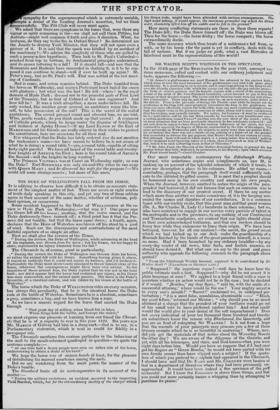THE DUKE OF WELLINGTON'S FALL FROM HIS IIORSE.
IT is edifying to observe how difficult it is to obtain an accurate state- ment of the simplest matter of fact. There are seven or eight oracles of truth daily speaking in this city, and yet any two- of them seldom agree in their account of the same matter, whether of criticism, poli- tical opinion, or occurrence. Some accident happened to the Duke of WELLINGTON at the re- view in Hydt. Park on Wednesday,—what was it ? One paper says his Grace fell Otrilis horse ;..ahother, that the horse reared, and the Duke dexterously threw lumselt off; a third print has it that the Pre- mier did not tumble, but that the horse came down ; a fourth, again, declares that the Hero of Waterloo was blown off his steed by a gust of wind. Such are the discrepancies and contradictions of the most faithful reporters of so simple an affair. First we shall give the version of the Times.
" During the review, the Duke of Wellington, while advancing at the head of his regiment, was thrown from his horse ; but his Grace, we are happy to state, experienced no injury whatever from the fall."
The Chronicle is, of course, great in particularity.
-" During the review the Duke of Wellington was thrown from his horse, or rather the animal fell with his Grace. Something having given it alarm, it reared so suddenly that it could not regain its balance, and fell backwards. Fortunately the Duke most dexterously managed to throw himself clear of the horse, otherwise the consequences might have been very serious. To the inquiries of those around him, the Duke replied that he was not in the least hurt ; nor did it appear that the horse had sustained any injury, as his Grace was soon remounted, and the animal quite passive. The horse is the Duke's favourite, of a chestnut colour, and was ridden by his Grace at the battle of Waterloo."
The horse which the Duke of WELLINGTON rides on every occasion, has always this peculiarity, that he is the identical horse the Duke rode at the battle of Waterloo. Sometimes he is a chestnut, sometimes a grey, sometimes a bay, and we have known him a roan. As we have a sincere regard for the horse that carried the Duke through
" That great day of milling, when blood fell in lakes, When Kings held the bottle, and Europe the stakes,"
we must express our pleasure at learning from our friend the Chroni- cle that he is of a capacity to rear in this year 1829. Six years ago Mr. MARTIN of Galway had him in a dung-cart•,—that is to say, in a Parliamentary statement, which is next in credit for fidelity to a newspaper one. The Chronicle mentions this curious particular in the behaviour of the mob to the much-esteemed quadruped in question—we quote the sentence complete :- " At one time half a dozen people were seen on either side of the horse, endeavouring to obtain a shake of his hand."
We hope the horse was of sixteen hands at least, for the pleasure of distributing his manual courtesies among the mob. But we are wandering from the main point, the manner of the Duke's tumble.
The Standard beats all its contemporaries in its account of the matter :- " During the military evolutions, an accident occurred to the inspecting Field Marshal, which, but for the extraordinary docility of the charger which his Grace rode, might have been attended with serious consequences. The high wind taking, it would appear, the enormous grenadier cap which his Grace Wore, absolutely lifted him off his saddle and he fell to the ground."
How many conflicting statements are there in these three reports! The Duke fell ; the Duke threw himself off; the Duke was blown off: Then for the horse :—the horse frisky ; the horse rampant ; the horse extraordinarily docile. The same accuracy which thus treats of a nobleman's fall from, or with, or by his horse (for the point is yet in conflict), deals with the fall of nations. But if we judge ex pede, what a vast Hercules of falsehood must be the representations of this world!


















 Previous page
Previous page